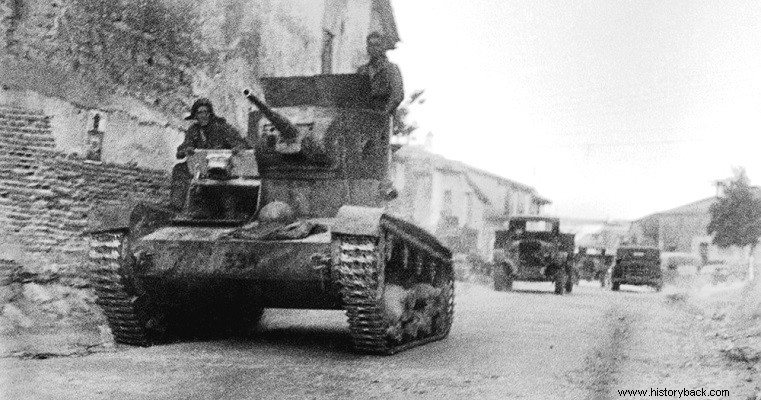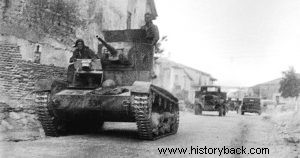
The Spanish Civil War broke out, in fact, much earlier than the military coup on July 17, 1936. It was a conflict where propaganda, on both sides, played an important role and many myths of which conflict still exist and plague the historical truth. At the end of May 1937, the republic looked particularly tired of the war and the strife between its constituent parts. The rise of Juan Negrín to the prime minister did little to raise the morale of the democrats. Negrin, an unknown, until then, socialist parliamentarian, with a great weakness for beautiful women and expensive cars, was not the strong personality that would unite the divided republic, divided between socialists, Trotskyists, anarchists, communists, Basque and Catalan separatists.
As for the Basques, they were fighting for survival against the nationalists and the new Negrin government decided it was time to reinforce them. For this purpose the republican troops launched two counter-distraction attacks in Aragon and Segovia. Both failed with significant losses in men and material. The republican staff had already been planning a major attack on Extremadura since the end of April, the success of which would clearly relieve the Basques and surprise the nationalists, who had neither serious forces in the area, nor reinforcements they could quickly bring.
The political attack of idiots
In addition, in Extremadura rebel groups were active behind the nationalists. The plan in question, the brainchild of General Torrado, was a classic application of maneuver on interior lines. It was simple to grasp and correct. However, the Spanish Communist Party (CKI) and especially Moscow had a different opinion. The new attack that democracy would launch should also have a political message!
That's why it should be launched near Madrid, the city symbol of the communists of the time. If the generals insisted on attacking Estramadura they could do so, but without the assistance of Russian tanks and aircraft! The ultimatum was impossible to ignore and Negrin accepted the communists' terms. The new attack would be launched in the sector northwest of Madrid. Its goal would be the occupation of the then insignificant village of Brunete. The attack in question would only make sense if it was carried out in parallel with a similar attack in the east, so that, in a sense, the two democratic peaks would trap important nationalist forces . Since a converging attack on two axes was not within the capabilities of the Republic even if successful it would only gain a few square kilometers of territory of no particular importance.
But Brunete's attack would be a demonstration of the KKI's power. For this, truly impressive forces were allocated for its conduct. On the right was the communist 5th Army Corps under the incompetent "general" Modesto, a former corporal of the Spanish colonial forces. The corps had three divisions, the 11th of the Moscow-trained, blame-phobic Lister, the 46th of ex-miner "El Campesino" and the 35th of the Polish "General Walter", who already had credentials as a butcher of his men at Segovia.
A common characteristic of all these "generals" was their indifference to the blood of their men and their bordering on stupidity in military matters. All five International Brigades were integrated into these forces. The objective objective of the 5th Corps was the capture of Brunete. The corps would be supported by all available tanks and aircraft. To the left of the 5th was the 18th Army Corps, under the Spanish Jurado initially, but he could not stand what he was seeing and resigned and Colonel Casado later. And this had three divisions, the 10th, 15th and 34th.
In the second echelon were the 14th Division under the anarchist worthy but self-taught "general" Thipriano Mera, the 45th Division under Moldovan, an agent of the USSR and known incompetence "general" Kleber (died in a gulag) and the 69th Division. The attack would be supported by 170 tanks and armored vehicles, 217 field guns, 50 bombers and 90 fighter aircraft. It was the largest concentration of forces that democracy had achieved up to that time. Nearly 80,000 men (other sources say 85,000) were assembled, supported by 150-300 aircraft, depending on the source, and at least 190 tanks and armored vehicles, all armed with cannons, against which the nationalists could do nothing. The nationalists for their part guarded the entire front with one division, the 71st. Actually there was no continuous front, but small nationalist detachments in various villages or in specific territorial features.
How to slaughter your own men...
At first light on July 6 the attack began. The 34th Division of the 18th Corps was the first to attack the small village of Villanueva de la Cañada, where it met incredibly stubborn resistance. Miaha, the one in overall command of the attack, sent word, demanding the capture of the village at all costs. "If necessary place an artillery barrage behind our men and force them to move," he wrote . And yet there was no reason to exhaust the offensive forces of the republicans around Kaniada or any other hamlet. Quite simply the nationalist strongholds could simply be bypassed and neutralized by the reserve forces. The cut off nationalist companies would have no choice but to surrender.
But following Miacha's "wise" orders to the letter, the republican troops engaged in bloody battles with the small nationalist garrisons in the various villages, wasting valuable time and disrupting their attack. In Kaniada, the defending nationalists, although outnumbered by a ratio of 1:9, lasted the whole day. In the other sector of the front Lister's 11th Division advanced unmolested and captured Brunete. But instead of continuing its movement, it stopped there, turning northeast and encircling all the nationalist forces fighting in the area.
Afraid to take charge, Lister halted and waited for El Campasino's division to advance and cover his right flank, when there was no threat of overrunning them. El Campesino, however, needed three whole days to break the resistance of a single Falagite battalion in the village of Quihorna. The latter exhausted his division in a futile struggle, instead of advancing and joining Lister, merely keeping Quixhorna's garrison under observation. After all, he had nothing to fear. Woe if a nationalist battalion were able to threaten the lines of communication of an entire army.
Of course, the nationalists did not leave these three days unexploited. Nationalist General Varela, who took command, brought up the 150th Division which he immediately launched against the junction point of Lister's and Campesino's divisions. To support his threatened center Modesto threw into the battle the reserve 35th Division. And that's where the miracle happened. Just two Nationalist divisions (150th, 71st), one of them closely engaged (71st) in a defensive struggle with an opposing corps, not only held nine enemy divisions, but forced the opponents to engage even their reserves!
Miaha then reinforced his 5th Corps with the 15th Division of the 18th Corps. The 15th Division was commanded by the most incompetent and perhaps criminal commander of the republican army, the Hungarian communist Gal. Gall, having sent his tanks into trunk-covering positions, used them as self-propelled guns (!) and unleashed his hapless infantry in frontal attacks against the Nationalist machine guns. With a donkey's tenacity he constantly threw in new forces, insisting on occupying a hill, which his men called "mosquito hill", because of the constant hum of the bullets.
In these ridiculous attacks, the flower of the international brigades was swept away. There were battalions that lost 70% of their men. Nevertheless, Gall continued to order an attack. In the meantime Varela brought the 13th Division to the battlefield. This division held the front opposite the republican 18th Corps, allowing Varela to rally the battered but tireless 71st and 150th divisions and launch an attack with them against the republican 5th Army Corps. Varela actually managed to stop the advance of the democratic divisions. That was the first step. The reinforcements were coming down.
The Condor soars…
On July 11, the democrats received the first visits from the aircraft of the German "Legion Condor". The Germans concentrated their effort against the Republican tanks. Within two days about 130 tanks and armored vehicles of the republics had been destroyed. The German fighter pilots had managed to gain local air superiority, since the Soviet operators, according to the republican army fighters, avoided engagement and usually left, allowing the Germans to strike the ground units in peace. /strong> When other reinforcements arrived at the front (1st Army Corps under Jague), the nationalists launched a fierce counterattack and began to repel the republicans. Chaos soon prevailed in the republican camp, although against the nine divisions of the republicans the nationalists mustered only five of their own and two Navarrian brigades.
German aircraft had isolated the battlefield, preventing the arrival of ammunition, supplies and even water to the republican troops. The nationalist offensive was slowly gaining ground, despite the fact that the democrats were still outnumbered. By July 24, the nationalists had pushed them back almost to their lines of departure. The great democratic or rather communist offensive had failed miserably. The democratic army in this pointless battle suffered losses of 25,000 men, against only 7,000 of the nationalists. The losses in material, so difficult to replace, were also enormous. The republic lost 80% of its tanks, dozens of cannons, hundreds of machine guns and thousands of weapons in Brunete. Thousands of brave men, especially those of the international brigades, sacrificed themselves needlessly to achieve a political goal.
The CPI had, at the military level, become the destroyer of democracy. And his "glorious" military commanders, due to propaganda, proved once again to be too small on the battlefield . Their incomprehensible responsibility, a product of the party mentality, did not allow them to take advantage of the opportunities that actually presented themselves in the first days of the battle. Instead they exhausted their brave troops in a struggle of attrition, which at that time only benefited the nationalists. In general, the battle of Brunete can be said to have been the grave of democracy. Nevertheless, by turning white into black, the Democrats claimed a great victory in Brunete!

Soviet T-26 tank of the republics. It carried a 45 mm cannon. and was capable of destroying every chariot of the nationalists.
